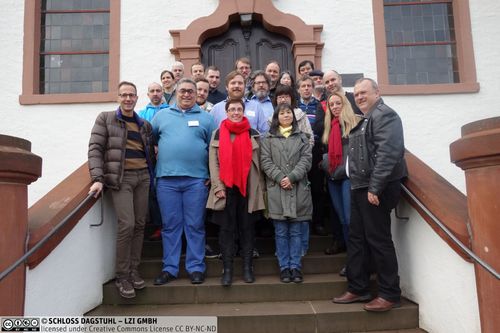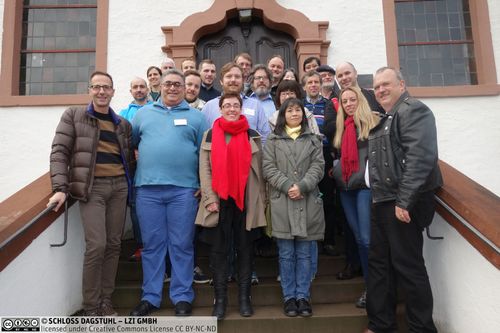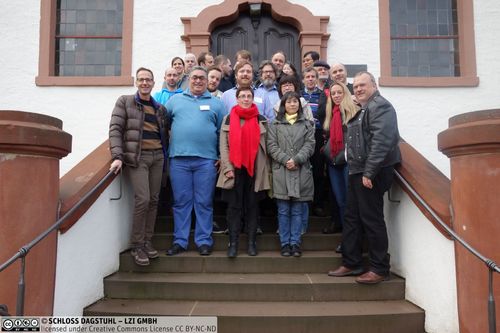Dagstuhl-Perspektiven-Workshop 16472
QoE Vadis?
( 20. Nov – 25. Nov, 2016 )
Permalink
Organisatoren
- Markus Fiedler (Blekinge Institute of Technology - Karlskrona, SE)
- Sebastian Möller (TU Berlin, DE)
- Peter Reichl (Universität Wien, AT)
- Min Xie (Telenor Research - Trondheim, NO)
Kontakt
- Annette Beyer (für administrative Fragen)
Publikationen
- QoE Vadis? (Dagstuhl Perspectives Workshop 16472). Markus Fiedler, Sebastian Möller, Peter Reichl, and Min Xie. In Dagstuhl Reports, Volume 6, Issue 11, pp. 129-141, Schloss Dagstuhl - Leibniz-Zentrum für Informatik (2017)
- QoE Vadis? (Dagstuhl Perspectives Workshop 16472). Markus Fiedler, Sebastian Möller, Peter Reichl, and Min Xie. In Dagstuhl Manifestos, Volume 7, Issue 1, pp. 30-51, Schloss Dagstuhl - Leibniz-Zentrum für Informatik (2018)
Programm
During the last decade, the transition from the technology-oriented notion of QoS (Quality of Service) to the user-centric concept of QoE (Quality of Experience) has become an important paradigm change in communication networking research, which has significantly been influenced by three related Dagstuhl Seminars organized in 2009, 2012 and 2015. Since then, a stable scientific community has been formed which has managed to establish QoE as a novel research topic in key international conferences, projects and journals while, more recently, also a closer link between QoE and UX (user experience) has started to develop. Altogether, this leads to the urgent need of critically reflecting within this joint community the future perspectives and directions of QoE research, which is of vital importance also to the societal impact of ICT in general.
Hence, this interdisciplinary Dagstuhl Perspectives Workshop aims at (1) strengthening the position of QoE within economically viable product and service development and provisioning; and (2) providing sustainable recommendations for research funding and policy-making entities concerning the future of quality-related research.
To achieve this, we invite prominent scientists and practitioners on a senior level and from a broad range of different disciplines (information and communication technology, human-computer interaction, user experience, economics, social sciences, psychology, customer relation management, etc.), in order to critically reflect on the value, current state, application and future of QoE assessment from a broader perspective.
The outcomes will run through a thorough quality control process challenging the resulting theses and recommendations both from an internal and an external perspective. The key outcome will be a Dagstuhl Manifesto on the future of QoE research as a solid foundation for the further successful evolution of this highly relevant research field, covering
- a state-of-the-art and SWOT analysis of the current research landscape for QoE;
- a set of anticipations how the area of QoE might develop in the future;
- a set of theses on how the areas of QoE research will lead to innovative and improved products and services; and
- a set of recommendations for future funding of these areas.
During the recent decade, the transition from the technology-oriented notion of QoS (Quality of Service) to the user-centric concept of QoE (Quality of Experience) has become an important paradigm change in communication networking research. Simultaneously, the field of QoE as such has significantly developed and matured. This is amongst others reflected in the series of three Dagstuhl Seminars 09192 "From Quality of Service to Quality of Experience" (2009), 12181 "Quality of Experience: From User Perception to Instrumental Metrics" (2012), nd 15022 "Quality of Experience: From Assessment to Application" (2015).
The QoE-related Dagstuhl Seminars had a significant impact on the understanding, definition and application of the QoE notion and concepts in the QoE community, for instance with respect to redefining fundamental concepts of quality. That work was performed in close collaboration with the COST Action IC1003 Qualinet [1] that has been concentrating on QoE in multimedia systems and services, and is still actively convening experts from all over the world to regular meetings and exchanges. In particular, this collaboration has led to the widely regarded Qualinet White Paper on "Definitions of QoE and related concepts" [1] and to the launch of a new journal entitled "Quality and User Experience" [2], fostering the scientific exchange within and between QoE and User Experience (UX) communities.
Realising the urgent need of jointly and critically reflecting the future perspectives and directions of QoE research, the QoE-related Dagstuhl Seminars were complemented by the present Dagstuhl Perspectives Workshop 16472 "QoE Vadis?", whose output is compiled in a Dagstuhl Manifesto. Besides of having brought together the two communities much closer, and besides triggering new events such as special sessions at conferences, the main outcome of the workshop has been concretized in terms of 11 recommendations to be communicated to stakeholders in the QoE and UX domains.
The workshop was organised around the writing process of the Manifesto draft: Starting from personal statements instead of talks, two sets of group works were arranged, whose output was criticially reviewed by "Advocatii Diaboli" and then refined and extended. A final review round by one representative of each the QoE and the UX group was performed before the Manifesto draft was completed by the end of the week.
- European Network on Quality of Experience in Multimedia Systems and Services (COST IC 1003 Qualinet), http://www.qualinet.eu (last seen 2017-02-24).
- Quality and Experience (QUEX), a journal published by Springer, http://link.springer.com/journal/41233 (last seen 2017-02-24).
 Markus Fiedler, Sebastian Möller, Peter Reichl, and Min Xie
Markus Fiedler, Sebastian Möller, Peter Reichl, and Min Xie
- Jan-Niklas Antons (TU Berlin, DE) [dblp]
- Luigi Atzori (University of Cagliari, IT) [dblp]
- Katrien De Moor (NTNU - Trondheim, NO) [dblp]
- Touradj Ebrahimi (EPFL - Lausanne, CH) [dblp]
- Sebastian Egger-Lampl (AIT Austrian Institute of Technology - Wien, AT) [dblp]
- Markus Fiedler (Blekinge Institute of Technology - Karlskrona, SE) [dblp]
- Jörgen Gustafsson (Ericsson Research - Luleå, SE) [dblp]
- Tobias Hoßfeld (Universität Duisburg-Essen, DE) [dblp]
- Lucjan Janowski (AGH Univ. of Science & Technology - Krakow, PL) [dblp]
- Kalevi Kilkki (Aalto University, FI) [dblp]
- Udo Krieger (Universität Bamberg, DE) [dblp]
- Effie Lai-Chong Law (University of Leicester, GB) [dblp]
- Sebastian Möller (TU Berlin, DE) [dblp]
- Marianna Obrist (University of Sussex - Brighton, GB) [dblp]
- Peter Reichl (Universität Wien, AT) [dblp]
- Virpi Hannele Roto (Aalto University, FI) [dblp]
- Henning Schulzrinne (Columbia University - New York, US) [dblp]
- Lea Skorin-Kapov (University of Zagreb, HR) [dblp]
- Jan Van Looy (Ghent University, BE) [dblp]
- Martín Varela (VTT Technical Research Centre of Finland - Oulu, FI) [dblp]
- Katarzyna Wac (University of Geneva, CH) [dblp]
- Felix Wu (University of California - Davis, US) [dblp]
- Min Xie (Telenor Research - Trondheim, NO) [dblp]
- Hans-Jürgen Zepernick (Blekinge Institute of Technology - Karlskrona, SE) [dblp]
Verwandte Seminare
- Dagstuhl-Seminar 09192: From Quality of Service to Quality of Experience (2009-05-05 - 2009-05-08) (Details)
- Dagstuhl-Seminar 12181: Quality of Experience: From User Perception to Instrumental Metrics (2012-05-01 - 2012-05-04) (Details)
- Dagstuhl-Seminar 15022: Quality of Experience: From Assessment to Application (2015-01-04 - 2015-01-07) (Details)
- Dagstuhl-Seminar 23042: Quality of Sustainable Experience (QoSE) (2023-01-22 - 2023-01-25) (Details)
Klassifikation
- networks
- society / human-computer interaction
- world wide web / internet
Schlagworte
- Quality of Experience
- user experience
- multimedia
- network quality monitoring and measurement
- network and application management
- socio-economic and business aspects




 Creative Commons BY 3.0 Unported license
Creative Commons BY 3.0 Unported license
